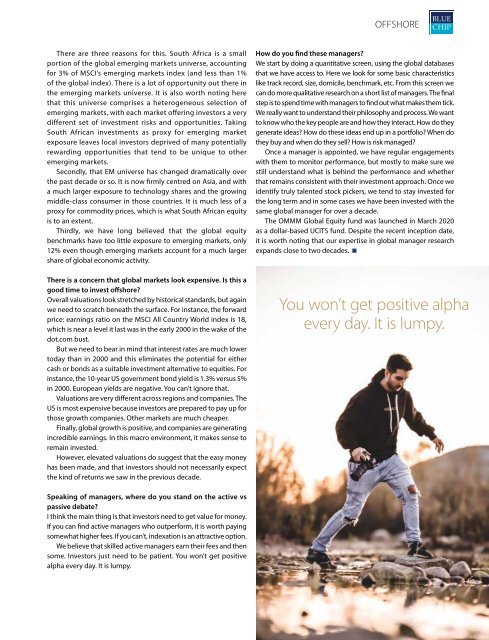Blue Chip Issue 81
Blue Chip is a quarterly journal for the financial planning industry and is the official publication of the Financial Planning Institute of Southern Africa NPC (FPI), effective from the January 2020 edition. Blue Chip publishes contributions from FPI and other leading industry figures, covering all aspects of the financial planning industry. Blue Chip takes this opportunity to wish the FPI a happy 40th anniversary. Congratulations!
Blue Chip is a quarterly journal for the financial planning industry and is the official publication of the Financial Planning Institute of Southern Africa NPC (FPI), effective from the January 2020 edition. Blue Chip publishes contributions from FPI and other leading industry figures, covering all aspects of the financial planning industry.
Blue Chip takes this opportunity to wish the FPI a happy 40th anniversary.
Congratulations!
You also want an ePaper? Increase the reach of your titles
YUMPU automatically turns print PDFs into web optimized ePapers that Google loves.
OFFSHORE<br />
There are three reasons for this. South Africa is a small<br />
portion of the global emerging markets universe, accounting<br />
for 3% of MSCI’s emerging markets index (and less than 1%<br />
of the global index). There is a lot of opportunity out there in<br />
the emerging markets universe. It is also worth noting here<br />
that this universe comprises a heterogeneous selection of<br />
emerging markets, with each market offering investors a very<br />
different set of investment risks and opportunities. Taking<br />
South African investments as proxy for emerging market<br />
exposure leaves local investors deprived of many potentially<br />
rewarding opportunities that tend to be unique to other<br />
emerging markets.<br />
Secondly, that EM universe has changed dramatically over<br />
the past decade or so. It is now firmly centred on Asia, and with<br />
a much larger exposure to technology shares and the growing<br />
middle-class consumer in those countries. It is much less of a<br />
proxy for commodity prices, which is what South African equity<br />
is to an extent.<br />
Thirdly, we have long believed that the global equity<br />
benchmarks have too little exposure to emerging markets, only<br />
12% even though emerging markets account for a much larger<br />
share of global economic activity.<br />
There is a concern that global markets look expensive. Is this a<br />
good time to invest offshore?<br />
Overall valuations look stretched by historical standards, but again<br />
we need to scratch beneath the surface. For instance, the forward<br />
price: earnings ratio on the MSCI All Country World index is 18,<br />
which is near a level it last was in the early 2000 in the wake of the<br />
dot.com bust.<br />
But we need to bear in mind that interest rates are much lower<br />
today than in 2000 and this eliminates the potential for either<br />
cash or bonds as a suitable investment alternative to equities. For<br />
instance, the 10-year US government bond yield is 1.3% versus 5%<br />
in 2000. European yields are negative. You can’t ignore that.<br />
Valuations are very different across regions and companies. The<br />
US is most expensive because investors are prepared to pay up for<br />
those growth companies. Other markets are much cheaper.<br />
Finally, global growth is positive, and companies are generating<br />
incredible earnings. In this macro environment, it makes sense to<br />
remain invested.<br />
However, elevated valuations do suggest that the easy money<br />
has been made, and that investors should not necessarily expect<br />
the kind of returns we saw in the previous decade.<br />
How do you find these managers?<br />
We start by doing a quantitative screen, using the global databases<br />
that we have access to. Here we look for some basic characteristics<br />
like track record, size, domicile, benchmark, etc. From this screen we<br />
can do more qualitative research on a short list of managers. The final<br />
step is to spend time with managers to find out what makes them tick.<br />
We really want to understand their philosophy and process. We want<br />
to know who the key people are and how they interact. How do they<br />
generate ideas? How do these ideas end up in a portfolio? When do<br />
they buy and when do they sell? How is risk managed?<br />
Once a manager is appointed, we have regular engagements<br />
with them to monitor performance, but mostly to make sure we<br />
still understand what is behind the performance and whether<br />
that remains consistent with their investment approach. Once we<br />
identify truly talented stock pickers, we tend to stay invested for<br />
the long term and in some cases we have been invested with the<br />
same global manager for over a decade.<br />
The OMMM Global Equity fund was launched in March 2020<br />
as a dollar-based UCITS fund. Despite the recent inception date,<br />
it is worth noting that our expertise in global manager research<br />
expands close to two decades. <br />
You won’t get positive alpha<br />
every day. It is lumpy.<br />
Speaking of managers, where do you stand on the active vs<br />
passive debate?<br />
I think the main thing is that investors need to get value for money.<br />
If you can find active managers who outperform, it is worth paying<br />
somewhat higher fees. If you can’t, indexation is an attractive option.<br />
We believe that skilled active managers earn their fees and then<br />
some. Investors just need to be patient. You won’t get positive<br />
alpha every day. It is lumpy.


















